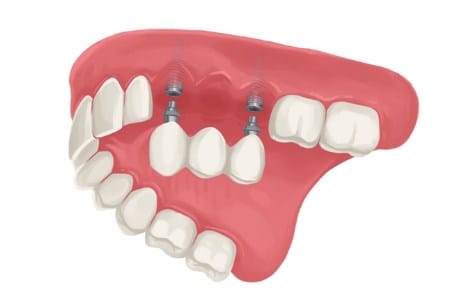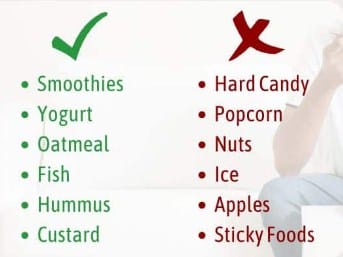Dear audience welcome to another blow post. Today we will discuss on What to eat after dental implant surgery and why no dairy after dental implant. I hope this post will be very important if you have done dental implant surgery.
Dental implant surgery has become a common and effective solution for restoring missing teeth and enhancing oral health and aesthetics. While the procedure itself is relatively straightforward, the recovery phase plays a crucial role in ensuring the success of the implant. One often overlooked aspect of the recovery process is the dietary restrictions that patients must follow post-surgery. In particular, the advice to avoid dairy products after dental implant surgery is grounded in science and contributes significantly to the overall healing process.
The Dental Implant Surgery Process
Before delving into the reasons for avoiding dairy after dental implant surgery, it’s essential to understand the surgical process itself. Dental implant surgery involves the placement of a titanium post into the jawbone, which serves as an artificial tooth root. This post then fuses with the jawbone over time, providing a stable foundation for a crown or prosthetic tooth. Proper healing and osseointegration, the process of the implant integrating with the bone, are crucial for the long-term success of the procedure.


Reasons to Avoid Dairy After Dental Implant Surgery or why no dairy after dental implant
Inflammatory Response:
Dairy products, particularly those high in fat and protein, can trigger an inflammatory response in the body. Inflammation impedes the healing process and can negatively impact the implant’s ability to integrate with the surrounding bone. By avoiding dairy, patients reduce the risk of inflammation and promote better healing.
Risk of Infection:
Dairy products can be a breeding ground for bacteria, especially when consumed in the immediate aftermath of surgery. Post-surgery, the body’s immune system is working hard to fight off potential infections. Consuming dairy, which may contain harmful bacteria, increases the risk of infection at the surgical site.
Calcium and Bone Healing:
While dairy is often associated with calcium, which is vital for bone health, the timing of dairy consumption is crucial. Immediately after dental implant surgery, the body’s priority is to prevent bleeding, form a clot, and start the initial stages of healing. Calcium-rich foods like dairy can potentially interfere with blood clot formation, which is necessary to prevent excessive bleeding and initiate the healing process.
Acidic Content:
Some dairy products, such as yogurt and cheese, can be acidic in nature. Consuming acidic foods can irritate the surgical site and slow down the healing process according to this dentist in Wayne NJ. Additionally, acid can weaken the enamel of adjacent teeth, potentially leading to oral health complications.
Watch the following YouTube video about Dental Implant Surgery
Recommended Diet Post Dental Implant Surgery
In place of dairy products, patients are encouraged to focus on a soft, nutrient-rich diet that supports healing without compromising the integrity of the implant. This may include:
Soft Fruits and Vegetables: Mashed bananas, cooked vegetables, and smoothies are excellent options that provide vitamins and minerals without putting stress on the surgical site.
Lean Proteins: Incorporating lean proteins like fish, eggs, and well-cooked poultry can help with tissue repair and healing.
Hydration: Staying hydrated is essential for the healing process. opt for water and non-acidic beverages to ensure adequate hydration without irritating the surgical area.
Supplements: If concerned about calcium intake, patients can discuss calcium supplements with their dentist or healthcare provider. It’s important to get professional advice before introducing any supplements into the diet.
What to eat after dental implant surgery
What to eat after dental implant surgery? Recovering from dental implant surgery requires a delicate balance between providing your body with the necessary nutrients for healing and avoiding foods that could potentially disrupt the healing process. Here’s a comprehensive guide on what to eat after dental implant surgery to ensure a smooth recovery:
Soft Foods: In the immediate days following dental implant surgery, it’s best to stick to soft foods that don’t require much chewing. This helps prevent unnecessary strain on the surgical site. Some examples include:
Soups: Warm, broth-based soups are easy to consume and provide essential hydration and nutrients.
Smoothies: Blended fruits, vegetables, and proteins offer a nutritious and easily digestible option.
Yogurt: opt for plain, non-acidic yogurt without added sugars. Yogurt contains probiotics that can support gut health and boost your immune system.
Pudding and Jello: These desserts are gentle on your mouth and can be a tasty way to maintain your calorie intake.
Protein-Rich Foods: Protein is essential for tissue repair and healing. Incorporate sources of lean protein into your diet, such as:
Scrambled Eggs: Soft, well-cooked scrambled eggs provide a good protein source.
Fish: Flakey fish like salmon can be easily prepared and provide healthy omega-3 fatty acids.


Beans and Legumes: Soft-cooked beans and lentils offer plant-based protein and fiber.
- Cooked Vegetables: Steamed or boiled vegetables that are cooked until they are soft are excellent options. Avoid raw or crunchy vegetables that could irritate the surgical area.
- Fruits: Choose fruits that are ripe and soft. Applesauce, mashed bananas, and ripe pears are gentle choices.
- Hydration: Staying hydrated is crucial for recovery. Drink plenty of water and avoid beverages that are too hot or too cold, as extreme temperatures can potentially disrupt healing.
- Nutrient-Rich Grains: Soft grains like oatmeal and well-cooked rice can provide energy and essential nutrients.
- Avoid Irritants: While planning your post-implant surgery diet, it’s equally important to avoid foods and beverages that could potentially irritate the surgical site or impede the healing process. Here are some items to avoid:
Spicy Foods: Spices can cause discomfort and irritation, so it’s best to avoid them during the initial healing phase.
Acidic Foods: Citrus fruits, tomatoes, and other acidic foods can irritate the surgical site and delay healing.
Crunchy Foods: Hard and crunchy foods can put unnecessary pressure on the surgical area and should be avoided until you receive clearance from your dentist.
Hot and Cold Foods: Extreme temperatures can potentially disrupt blood flow and affect the healing process. Opt for lukewarm foods and beverages.
Supplements: If you’re concerned about meeting your nutritional needs, consider discussing supplements with your dentist or healthcare provider. They can guide you on the appropriate supplements to support your recovery.
Watch the following YouTube video about what to eat after dental implant surgery
Dental implant surgery is a transformative procedure that requires careful post-operative care to ensure its success. While dairy products play an important role in a balanced diet, avoiding them immediately after dental implant surgery can significantly contribute to a smoother and more successful recovery. By understanding the reasons behind this dietary restriction and following recommended guidelines, patients can help their implants integrate effectively and enjoy long-term oral health benefits. As always, it’s crucial to follow the advice of dental professionals and healthcare providers for the best outcomes.
More Valuable Writing:
Pros and Cons of Dental Implants
How sinful nutrition where every veggie has a dark side
Mistakes Job Seekers Should Avoid in Canada’s Booming Job










































